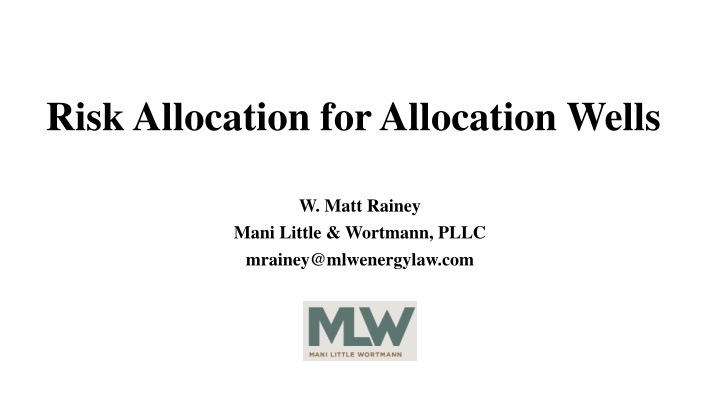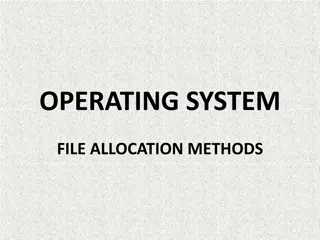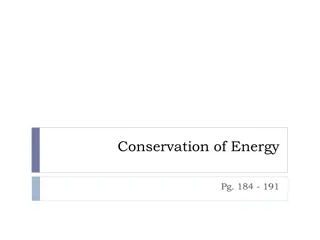Risk Allocation for Allocation Wells in Energy Law
Definition of allocation wells in energy law, advantages and disadvantages, lessees' rights, allocation of production to mineral owners, and legal cases related to pooling agreements. The content discusses various aspects of risk allocation for unagreed horizontal wells and the importance of clear agreements among stakeholders.
Uploaded on Jul 30, 2024 | 0 Views
Download Presentation

Please find below an Image/Link to download the presentation.
The content on the website is provided AS IS for your information and personal use only. It may not be sold, licensed, or shared on other websites without obtaining consent from the author.If you encounter any issues during the download, it is possible that the publisher has removed the file from their server.
You are allowed to download the files provided on this website for personal or commercial use, subject to the condition that they are used lawfully. All files are the property of their respective owners.
The content on the website is provided AS IS for your information and personal use only. It may not be sold, licensed, or shared on other websites without obtaining consent from the author.
E N D
Presentation Transcript
Risk Allocation for Allocation Wells W. Matt Rainey Mani Little & Wortmann, PLLC mrainey@mlwenergylaw.com
ALLOCATION WELL DEFINED Horizontal well traversing the boundary between two (or more) leases without an agreement (pooling, PSA, or otherwise) for determining how production between the leases will be shared Common Uses No pooling provisions in lease (Klotzman) no cross-conveyance of interest Inadequate pooling provisions or restrictive pooling No PSA(Production Sharing Agreement) or other written agreement (<65%)
Disadvantages Well-by-well accounting and division of interests (pooling is uniform across entire pooled unit) Perpetuates leases on drillsite tracts only Less flexibility for conducting drilling activities Owners not bound to production formula (room for dispute)
Advantages Economical (multiple traversed tracts) Timely - obtaining agreements from numerous owners is burdensome More flexibility for conducting drilling activities No ratification from non-drillsite mineral or NPRI owners (no pooling)
Lessees Rights Greatest Possible Estate allows lessee to drill anywhere on lease, including border to border, unless expressly prohibited by the lease Cockrell v. Texas Gulf Sulphur Co., 299 S.W.2d 672, 675 (Tex. 1956) Typical lease language does not limit type of development (vertical v. horizontal) Ownership of all minerals in place Right to drill, explore and produce from the land (these rights likely greater than determining how to pay royalties) No unauthorized cross-conveyances
Minerals in Place Absent a pooling agreement or allocation agreement, production is allocated to the mineral owners in the tract where the minerals are captured Japhet v. McRae, 276 S.W. 669, 670 (Tex. Comm n App. 1925, judgm t adopted) Lease grants fee simple determinable = 100% of minerals under leased premises; right to enter the land and extract minerals and all other such incidents thereto as are necessary to be used to enjoy them Tarrant Cty. Water Control & Imp. Dist. No. One v. Haupt, Inc., 854 S.W.2d 909,911 (Tex. 1993) Allocation does not convey interests to a third party
Reasonable Probability Browning Oil Co. v. Luecke Improper pooling where a horizontal well was drilled in violation of an anti-dilution provision in the lease; this failed to strictly comply with the pooling provisions in the lease; court held lessee must account to the lessor for production on an unpooled basis; rejected lessors veiled argument for the Confusion of Goods doctrine; ruled operator owed damages to be calculated on a determination of what production can be attributed to their tracts with reasonable probability 38 S.W.3d 625, 632 (Tex. App. - Austin 2000, pet. denied) Actual drilling of the horizontal well traversing two tracts was not the violation Did not establish a formula for reasonableprobability Suggests Confusion of Goods Doctrine would not apply No perforation/no production (Springer Ranch, Ltd. v. Jones)
Confusion of Goods Doctrine A party commingling goods must establish each owner s share with reasonable certainty Humble Oil & Ref. Co. v. West (Tex. 1974) Higher standard than fair, reasonable or probable Double the royalty payments? Improper allocation
3 BASIC TYPES OF ALLOCATION WELLS/UNITS 1. Two or more unpooled tracts or leases 2. Two or more pooled units, or 3. A pooled unit or units and one or more tracts or leases not included in such pooled unit or units
Allocation Formulas (reasonable probability) Length of Lateral First take-point to last take-point Entire wellbore surface to terminus Surface Acreage Basis Allocate among drillsite tracts Allocate to all tracts in a pooled unit # of Takepoints (perfs) Productive acreage (secondary recovery)
Why Not A Production Sharing Agreement? But I only need 65% of owners to agree Remaining unsigned parties technically still paid on allocated basis PSA typically contains reasonable probability formula May seem impossible to obtain Delay drilling must obtain PSA to obtain permit Benefit contractual Waive offsets Perpetuation by operations and/or production for all leases Limit exposure
Railroad Commission of Texas Administer the laws of conservation Courts settle questions of title and rights of possession Policy - Tex. Nat. Res. Code 85.046(c): RRC may permit wellbore commingling from different reservoirs, and surface commingling of oil and gas from two or more tracts of land, if RRC finds commingling prevents waste, promotes conservation or protects correlative rights. Amount of production attributable to each tract shall be determined in a manner consistent with this title Promote drilling; does not want to limit lessee s rights to develop which were granted in the lease Prevent waste Permitting Reasonably satisfactory showing of a good-faith claim to ownership in the property. Magnolia Petroleum Co. v. Railroad Commission of Texas (Tex. 1943) Leasehold or mineral interest Reasonable right to drill and develop > pooling authority PSA = >65% of royalty owners Still require Rule 37 waiver RRC is on board
RISKS & EXPOSURE Courts have not made allocation wells illegal; but haven t exactly ruled on their legality either Petition RRC to cancel permit? reasonable evidence of right to develop v. pooling authority Tort damages? slander of title false claim of right to pool interest Surface use dominant estate injury to surface or minerals on other tracts; likely not (must be excessiveuse ) THE LAW REMAINS UNSETTLED Brett Wells Unauthorized pooling (pro royalty owner), commingling is for different reservoirs Ernest Smith Produced and saved from lease premises (pro E&P), same as drilling multiple vertical wells; pooling authority NOT required to drill horizontal wells across lease lines Open to liability without complete contractual reliance between parties Royalty owners have successfully sued operators Successfully = $ettlement (Klotzman)(Spartan) mineral owner leverage Most mineral/royalty owners could not afford to litigate big oil Not worth their time and money - % ownership < Court Costs
House Bill 1552 (2015) Proposal to allow allocation wells based on reasonable determination of production from drillsite tracts Wanted to apply to RRC for rulings Did not make it out of committee
Monroe v. Texas Railroad Commission March 2018 Appealing complaint Devon had no contractual or legal right to drill an allocation well RRC s dismissal of RRC refused to answer legal questions Filed suit in District Court Monroe claims the RRC (1) acted unlawfully in granting an allocation permit and (2) acted unlawfully in granting Devon had established a good-faith claim to drill an allocation well with no pooling authority or PSA Wait and see!
SAMPLE LEASE PROVISION In addition to the creation of pooled units as provided for in this Lease, Lessee may, at its option, drill allocation wells and/or production sharing wells (either referred to herein as a SharingWell ) traversing said land or lands pooled therewith. For the purpose of computing the royalty to which owners of royalties and payments out of production are entitled on production of oil or gas from a Sharing Well, there shall be allocated to each tract or pooled unit containing Take Points in a Sharing Well a pro rata portion of the production from the Sharing Well, which pro rata portion is equal to the total production from the Sharing Well multiplied by a fraction, the numerator of which is the Productive Drainhole Length in the applicable tract or pooled unit and the denominator of which is the total Productive Drainhole Length in the Sharing Well. The portion of the production from a Sharing Well allocated to a pooled unit containing this Lease shall be further allocated to the owners of royalties and payments out of production under this Lease as provided for in Paragraph No. 5 hereof. Operations on or production from a Sharing Well shall be deemed to be operations on or production on and from this Lease. For the purposes of this Lease (1) SharingWell means a Horizontal Drainhole Well with Take Points in: (i) two or more unpooled tracts or leases, (ii) two or more pooled units, or (iii) a pooled unit or units and one or more tracts or leases not included in such pooled unit or units, (2) TakePoint means any point along a horizontal wellbore where oil or gas can be produced in the wellbore from the reservoir or field interval in question, and (3) Productive Drainhole Length means the horizontal length of the wellbore path that begins at the first Take Point and runs along the actually surveyed path of the wellbore to the last Take Point. This length will be determined by an asdrilled survey performed after the Sharing Well is drilled and completed. W. Matt Rainey Mani Little & Wortmann, PLLC mrainey@mlwenergylaw.com























